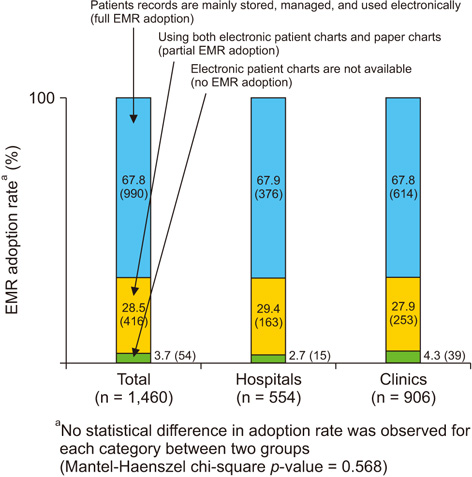Current Status of Electronic Medical Record Systems in Hospitals and Clinics in Korea
- Affiliations
-
- 1Health Insurance Review & Assessment Research Institute, Health Insurance Review & Assessment Service, Wonju, Korea. pty0601@hira.or.kr
- 2Department of Preventive Medicine, Hanyang University College of Medicine, Seoul, Korea.
- KMID: 2403309
- DOI: http://doi.org/10.4258/hir.2017.23.3.189
Abstract
OBJECTIVES
Many healthcare organizations and professionals have had interests in healthcare information and communication technology (ICT). The objective of this study was to investigate the current status of overall healthcare ICT, especially focusing on Electronic Medical Record (EMR) systems in Korea.
METHODS
This study used a part of the nationwide survey collected for the OECD benchmarking ICT study. The Health Insurance Review and Assessment Service conducted the survey from November 19, 2013 to January 10, 2014. This study followed the methodological guidelines of the OECD. A total of 2,093 hospitals and clinics, including long-term care hospitals, participated in the survey. Among them, 554 hospitals and 906 clinics were included in this study for the generalization of the results.
RESULTS
The adoption rates of EMR systems were 96.3% in hospitals and 95.7% in clinics. Most of the hospitals and clinics had high rates of healthcare information exchange (HIE) within the organization; however, there were extremely low HIE rates among external organizations. Most of the hospitals and clinics had EMR systems with clinical-decision-supporting functionalities. Ninety-six percent of the EMR systems of the hospitals and 89.2% of the clinic systems had checking functions, such as alerts or reminders, on contraindications of drug-drug and drug-age interaction.
CONCLUSIONS
Korea has maintained a high healthcare ICT status compared to countries in the European Union. The EMR systems of hospitals and clinics in Korea had sophisticated functionalities; however, their HIE status was extremely low, which indicates the need for healthcare ICT standardization.
Keyword
MeSH Terms
Figure
Cited by 4 articles
-
Satisfaction with Paper-Based Dental Records and Perception of Electronic Dental Records among Dental Professionals in Myanmar
Sai Wai Yan Myint Thu, Boonchai Kijsanayotin, Jaranit Kaewkungwal, Ngamphol Soonthornworasiri, Wirichada Pan-ngum
Healthc Inform Res. 2017;23(4):304-313. doi: 10.4258/hir.2017.23.4.304.Association between Electronic Medical Record System Adoption and Healthcare Information Technology Infrastructure
Youn-Tae Lee, Young-Taek Park, Jae-Sung Park, Byoung-Kee Yi
Healthc Inform Res. 2018;24(4):327-334. doi: 10.4258/hir.2018.24.4.327.Clinical Decision Support Functions and Digitalization of Clinical Documents of Electronic Medical Record Systems
Young-Taek Park, Yeon Sook Kim, Byoung-Kee Yi, Sang Mi Kim
Healthc Inform Res. 2019;25(2):115-123. doi: 10.4258/hir.2019.25.2.115.Association between Full Electronic Medical Record System Adoption and Drug Use: Antibiotics and Polypharmacy
Young-Taek Park, Donghwan Kim, Rae Woong Park, Koray Atalag, In Ho Kwon, Dukyong Yoon, Mona Choi
Healthc Inform Res. 2020;26(1):68-77. doi: 10.4258/hir.2020.26.1.68.
Reference
-
1. Chaudhry B, Wang J, Wu S, Maglione M, Mojica W, Roth E, et al. Systematic review: impact of health information technology on quality, efficiency, and costs of medical care. Ann Intern Med. 2006; 144(10):742–752.
Article2. Campanella P, Lovato E, Marone C, Fallacara L, Mancuso A, Ricciardi W, et al. The impact of electronic health records on healthcare quality: a systematic review and meta-analysis. Eur J Public Health. 2016; 26(1):60–64.
Article3. Kamau N. Electronic health documentation and its impact on nurses routine practices [master's thesis]. Helsinki, Finland: Laurea University of Applied Sciences;2015.4. Bowman S. Impact of electronic health record systems on information integrity: quality and safety implications. Perspect Health Inf Manag. 2013; 10:1c.5. Khangura S, Grimshaw J, Moher D. Evidence summary: Electronic Health Records (EHRs): to the chief information officer of the Champlain LHIN. Ottawa, Canada: Ottawa Hospital Research Institute;2010.6. Organisation for Economic Co-operation and Development. Draft OECD guide to measuring ICTs in the health sector. Paris, France: Organisation for Economic Co-operation and Development;2015.7. Zelmer J, Ronchi E, Hypponen H, Lupianez-Villanueva F, Codagnone C, Nohr C, et al. International health IT benchmarking: learning from cross-country comparisons. J Am Med Inform Assoc. 2017; 24(2):371–379.
Article8. Kim YG, Jung K, Park YT, Shin D, Cho SY, Yoon D, et al. Rate of electronic health record adoption in South Korea: a nation-wide survey. Int J Med Inform. 2017; 101:100–107.
Article9. Codagnone C. Benchmarking information and communication technologies in health systems: adoption of ehealth among general practitioners. In : Proceedings of the Joint EC-OECD Workshop; 2013 Apr 18-19; Brussels, Belgium.10. Maghiros I, Sabes-Figuera R. European hospital survey: benchmarking deployment of e-health services. In : Proceedings of Joint EC-OECD Workshop; 2013 Apr 18-19; Brussels, Belgium.11. Deidda M, Lupianez-Villanueva F, Maghiros I. European hospital survey: benchmarking deployment of ehealth services (2012–2013): methodological report. Luxembourg: European Commission;2013.12. Sabes-Figuera R, Maghiros I. European hospital survey: benchmarking deployment of e-health services (2012–2013): synthesis outcomes. Luxembourg: European Commission;2013.13. Price Waterhouse Cooper on behalf of JRC-IPTS. European hospital survey: benchmarking deployment of ehealth services (2012–2013): final report. Luxembourg: European Commission;2014.14. European Commission. European hospital survey: benchmarking deployment of e-health services (2012–2013): questionnaire addressed to the CIOs of acute care hospitals (translated versions). Luxembourg: European Commission;2014.15. Lee M, Heo E, Lim H, Lee JY, Weon S, Chae H, et al. Developing a common health information exchange platform to implement a nationwide health information network in South Korea. Healthc Inform Res. 2015; 21(1):21–29.
Article16. US Department of Health and Human Services, Centers for Medicare & Medicaid Services. Medicare and Medicaid programs; electronic health record incentive program: Stage 3 and modifications to meaningful use in 2015 through 2017. Fed Regist. 2015; 80(200):62761–62955.17. Srivastava SK. Adoption of electronic health records: a roadmap for India. Healthc Inform Res. 2016; 22(4):261–269.
Article
- Full Text Links
- Actions
-
Cited
- CITED
-
- Close
- Share
- Similar articles
-
- Needs Assessment for Functionalities in Electronic Health Record Systems in General Hospitals
- Satisfaction with Paper-Based Dental Records and Perception of Electronic Dental Records among Dental Professionals in Myanmar
- Clinical Decision Support Functions and Digitalization of Clinical Documents of Electronic Medical Record Systems
- Factors Affecting Electronic Medical Record System Adoption in Small Korean Hospitals
- The Adoption of Electronic Medical Records and Decision Support Systems in Korea



